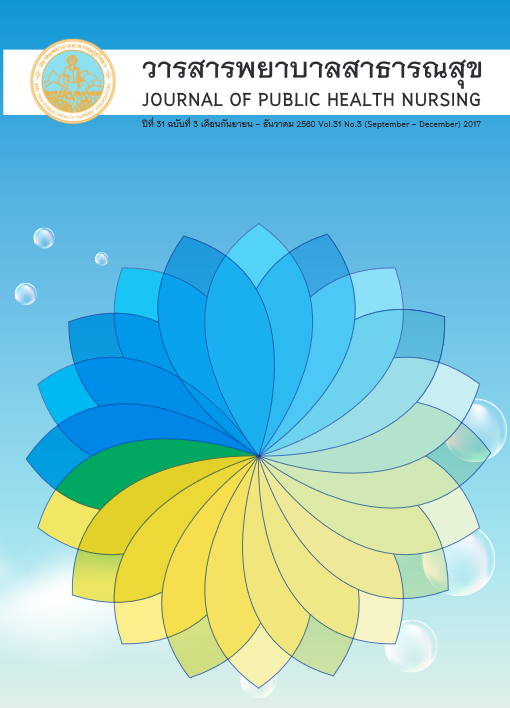Effects of Empowerment on Self-Care Behaviors and Sputum Examination of Patients with Tuberculosis
Keywords:
Patients with tuberculosis, empowerment, self-care behaviors, sputum examinationAbstract
Tuberculosis (TB) is a chronic infectious disease that takes a long time to treat. Most TB patients experience much suffering. If the treatment fails, it results in the spread of the infection into the community and can lead to drug resistant tuberculosis. This quasi-experimental study was conducted to investigate the effect of empowerment on self-care behaviors of tuberculosis patients and their sputum conversion rate. Study subjects were registered patients with tuberculosis receiving short-term clinical treatment for tuberculosis at Ratchaburi Hospital. The sample population was 44 patients selected as a simple random sample from new cases voluntarily registering on regular service days. The sample was divided into an experimental and a comparison group. The experimental group received empowerment training but the control group received regular service. The intervention used empowerment techniques. Data were collected using questionnaires that assessed demographic data of patients, self-care behaviors and included a sputum record form. Data were analyzed by descriptive statistics: percentage, mean, standard deviation; chi square test, Fisher’s exact test and Independent t- test. The results showed that, the mean change of self-care behavior in the experimental group was significantly greater than in the control group at the 0.05 level (t = 10.17, p <0.001). There was no statistically significant difference in sputum conversion rate. The findings support the effectiveness of the empowerment-promoting program which increases self-care behaviors of tuberculosis patients. Research findings suggest that community nurse practitioners or other healthcare personnel could apply this empowerment training to improve care for patients with tuberculosis in the community to reduce the spread of infection and tuberculosis drug resistance.
References
World Health Organization. Global tuberculosis control: A short update to the 2009 report. WHO report 2009. Geneva: World Health Organization; 2009.
Department of Disease Control, Ministry of Public Health. Report of tuberculosis program performance in Thailand, 2009-2015; 2016. (in Thai)
Bureau of tuberculosis, Department of Disease Control, Ministry of Public Health. National tuberculosis control program guidelines Thailand. 2nded. Bangkok: Agricultural Cooperative Federation of Thailand Limited; 2013. in Thai)
Bureau of tuberculosis, Department of Disease Control, Ministry of Public Health. Tuberculosis treatment guidelines in adults, 2012. Bangkok: Office of Publishing Enterprise Veterans Affairs under the Royal Patronage; 2012. (in Thai)
Doncommul P. Effectiveness of implementing empowerment program on adherence to treatment regimen among persons with intensive phase of pulmonary tuberculosis ,Lampang Hospital. [Master Thesis (Nursing)]. Chiang Mai: Chiang Mai University; 2012.
Boonnak S, Boompendej R, Hutanoon V, Vijitbanjong S. Death of tuberculosis patients during reatment Phra Nakhon Si Ayuthaya Province. Thai journal of tuberculosis chest diseases and critical care 2005; 28: 137-149. (in Thai)
Singhares R. Factors related to medication adherence among tuberculosis patients. [Master Thesis (Nursing)]. Chonburi: Burapha University; 2007.
Soonthorndhada A. Tuberculosis policy in Thailand : A civil society perspective. Nakhon Pathom: Institute for population and social research; 2007. (in Thai)
Rientrairat P, Chalasonthi M, Worakasemsuk P. The evaluation of treatment outcome of anti-tuberculosis drugs regimen CAT 2(2HRZES/1HRZE/5HRE) and anti-tuberculosis drugs regimen CAT 4 (second line drugs ) in pulmonary tuberculosis patients at tuberculosis cluster, Bureau of AIDS-TB-STIS. Thai journal of tuberculosis chest diseases and critical care 2006; 27: 222-228. (in Thai)
Sumano A. Effects of home visit program toward pulmonary tuberculosis patients' compliant behavior in Si Racha District, Chonburi Province. [Master Thesis (Nursing)]. Chonburi: Burapha University; 2007.
Pungsakul J. Default rate and related factors of new pulmonary tuberculosis cases in the social security system of the private hospitals in Samut-Prakan Province. [Master Science (Community Medicine)]. Bamgkok: Chulalongkorn University; 2005.
Ratchaburi Provincial Health Office. Performance report summary of results Ratchaburi. Ratchaburi: Ratchaburi Provincial Health Office; 2013. (in Thai)
Lertvasana S. Factors effecting self-care practices of pulmonary tuberculosis patients at Department of Health Bangkok Metropolitan Administration. [Master of Science Degree].Bangkok: Srinakharinvirot University; 2003.
Thanasilp S, Pakcharoen N. The effect of using educative-supportive group program on self care agency of HIV persons with pulmonary tuberculosis. Thai AIDS journal 2006; 18: 12–26. (in Thai)
Gibson CH. A study of empowerment in mothers of chronically ill children. [Unpublished Doctoral Dissertation]. Boston: Boston College; 1993.
Puraya A. Effects of empowerment program based on family participation self-efficacy and caring behavior for caregivers with cerebrovascular disease: A case study of Wangnumyen District: Srakeaw Province. [Master Thesis (Nursing)]. Chonburi: Burapha University; 2008.
Meetean T. Empowerment process for leukemic children: A case study method. [Master of Nursing Science Thesis]. Khon Kaen: Khon Kaen University; 2008.
Mahawarakom S. The effectiveness of the empowerment to control blood sugar on personal self-care with diabetes mellitus type II, and complications patients, Udon Thani Hospital, Udon Thani Province. [Master of Public Health Thesis]. Khon Kaen: Khon Kaen University; 2008.
Srisatidnarakul B. Research methodology in nursing. 5thed. Bangkok: U & I International Media; 2010. (in Thai)
Cohen S, Wallis TA. Stress social support and buffing hypothesis. Psychological Bulletin 1987; 98: 310-353.
Downloads
Published
How to Cite
Issue
Section
License
บทความที่ตีพิมพ์และแผนภูมิรูปภาพถือเป็นลิขสิทธิ์ของวารสารพยาบาลสาธารณสุข (Thai Public Health Nurses Association)







